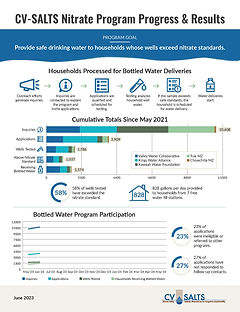
WATER FOR ALL
California dairy farmers are helping ensure safe drinking water today, while improving long-term protection of groundwater resources.
Challenge
Vision
Human and naturally-occurring contaminants in the San Joaquin Valley have led to impacted groundwater sources. Farming, including dairy farming, has caused nitrate contamination from the use of fertilizer to produce food and feed. Wastewater treatment, manufacturing, and food processing operations have also contributed. Naturally occurring contamination, such as arsenic, is also responsible for significant contamination of groundwater.
Dairy farms are improving strategies and piloting new technologies to improve the recycling of manure nutrients, as part of a broad strategy to improve the long-term protection of water resources.
Action
Dairy farmers are joining other farmers, food processors, manufacturers, and cities to ensure immediate access to clean drinking water in their rural communities.
Providing safe drinking water in areas where groundwater supplies do not meet safe standards for nitrate is the top priority. Dairy farmers are participating alongside other water users in local management zones that have been conducting outreach and encouraging people to apply for free well testing and drinking water if needed. Since 2021, more than 3,200 wells in these basins have been tested. More than 4.3 million gallons of free replacement drinking water, through free bottle-filling stations and via direct delivery to more than 2,000 households with impacted wells.
Learn more about CV-SALTS Nitrate Program Progress and Results.

Providing Safe Drinking Water
Protecting Water Quality Today
Central Valley dairies operate under the most comprehensive water quality regulations in the nation. Under Central Valley Water Board rules, dairies:
-
Prepare and follow certified Nutrient Management Plans and engineered Waste Management Plans (plans prepared by experts to ensure that manure is stored safely until it can be used as a crop nutrient, and that it is applied at the proper rates and times for growing crops);
-
Test all wells on their property and report results;
-
Participate in regional representative groundwater monitoring programs;
-
Export surplus manure for use on other farms; and
-
Sample and analyze soil, manure, and harvested crops to ensure compliance.
Learn more about California dairy farmers' efforts to improve water quality.




Central Valley Dairy Representative
Monitoring Program
Regulatory requirements in California’s Central Valley—where more than 90 percent of the state’s dairy cows are located—include annual testing of irrigation and domestic wells. Dairies also participate in the Central Valley Dairy Representative Monitoring Program (CVDRMP), a first-of-its-kind effort to evaluate dairy farm management practices and develop recommendations for future improvements.
Established in 2010, the CVDRMP is a non-profit group, organized by Central Valley dairy farmers who work with hydro-geologists and civil engineers. These experts ensure accurate information, providing significant value for dairies, their neighbors, and regulators.
-
More than 1,100 farms pay monthly fees to support ongoing monitoring and research to inform improved management.
-
The program includes 443 wells on 42 dairies from Orland south to Bakersfield, encompassing the wide range of soil, climate, and cropping conditions across Central Valley dairies.
-
All results are reported to the Central Valley Regional Water Quality Control Board and used to inform farm management practices.
You can contact CVDRMP at CVDRMP@gmail.com.

